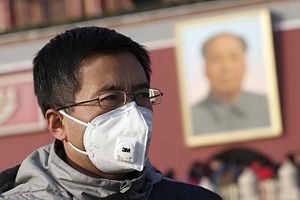Nowadays, many Chinese netizens, concerned about the health and wellbeing of their children and loved ones, keep a particular app on their smartphones, weilan ditu (blue map), to track live or the most updated data on air and water pollution in their neighborhood or home city. In addition, registered users can also upload pictures of wastewater dumping, smog, or any suspicious scenes of industrial pollution instantly from their phones.
What is quite extraordinary about this app, available since early 2016, is not merely the interactive and reliable nature of the data produced and shared, but the operational processes and data management mechanisms behind the screen. This app for the first time synthesizes and makes publicly available all government data on pollution (air and water) – with formal permission from China’s Ministry of Environmental Protection – and the data collected by the professional teams of the Institute of Public and Environmental Affairs (IPE), an independent NGO based in Beijing, as well as the numerous images supplied by ordinary netizens.
In the context of strict control over information by the state and the sensitivity of environmental pollution issues, which now is the number one cause of large-scale protests (those with more than 10,000 participants) in the country, such a case of collaboration between the Chinese central government and an environmental NGO in releasing pollution data instantly calls for explanation.
Once upon a time in 1994, a group of university professors and intellectuals sat down on the grass at Linglong Park in western Beijing, and began to talk of establishing a social organization devoted to environmental issues. They named this organization Friends of Nature (FoN), and hence began a new page of state-society relations and social activism in contemporary China, with experiments in nationwide non-governmental public education programs and campaigns on wildlife conservation, sustainable development, and environmental protection.

































